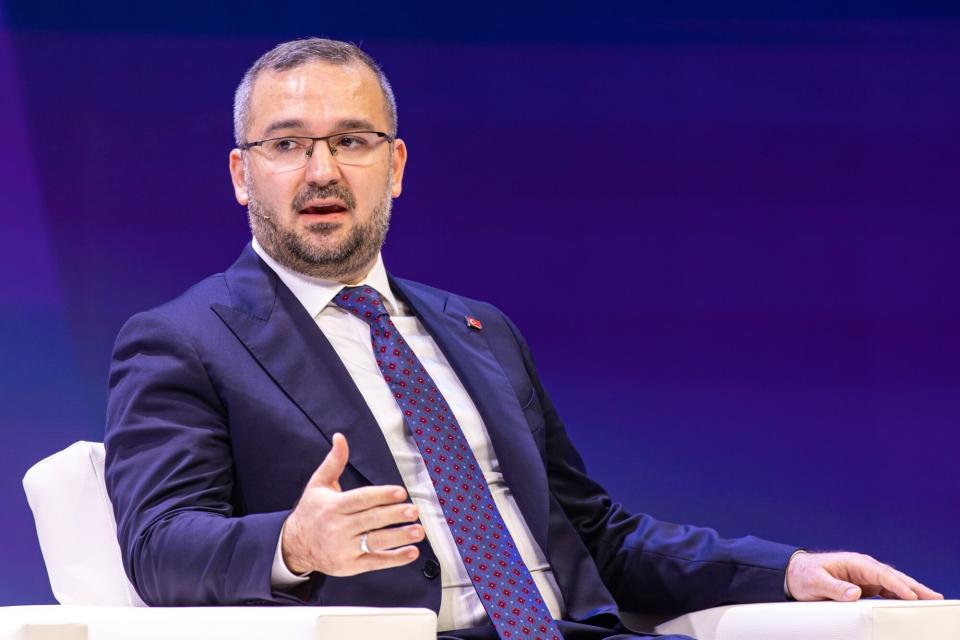Turkey Tilts Hawkish With Rate Kept at 50% for Another Month
(Bloomberg) -- Turkey extended an interest-rate pause in place since April, with the central bank telegraphing a hawkish path as it stays on alert for risks to inflation that just peaked above 75%.
Most Read from Bloomberg
SpaceX Tender Offer Said to Value Company at Record $210 Billion
Bolivia’s President Arce Swears in New Army Chief After Coup Bid
China’s Finance Elite Face $400,000 Pay Cap, Bonus Clawbacks
Supreme Court Blocks EPA ‘Good Neighbor’ Ozone Emission Rule
The Monetary Policy Committee led by Governor Fatih Karahan left the one-week repo rate at 50% on Thursday, in line with the forecasts of all economists surveyed by Bloomberg. The MPC repeated that its policy will remain tight “until a significant and sustained decline in the underlying trend of monthly inflation,” according to a statement.
The Turkish currency pared declines versus the dollar and traded little changed after the decision. Yields on 10-year lira government bonds extended their drop to seven basis points to 28.58%.
“In case of unanticipated developments in credit and deposit markets,” the central said it could introduce “additional macroprudential measures.”
“Liquidity conditions are closely monitored,” it said. “Sterilization will be implemented effectively by also enriching the toolset whenever needed.”
Rate cuts will probably remain off the table through much of the year as Turkish policymakers engineer a slowdown in the economy to lower one of the world’s highest levels of inflation. An aggressive cycle of monetary tightening that began a year ago is only now starting to cool off growth, in part because more restrictive financial conditions were out of sync with the generous fiscal measures such as sharp wage hikes enacted by the government.
But as fiscal policy tightens, an economic chill is starting to settle over Turkey to put inflation on track to start decelerating and reach around 72% in June. Officials are targeting inflation at 38% at the end of the year.
A measure of Turkish manufacturing activity has been below the 50-mark that separates expansion from contraction for two months, and factories are using less of their potential than at any point since last August. Pessimism across businesses is also on the rise, according to a survey by the central bank.
“The central bank is committed to maintaining its tight monetary stance, and inflation is finally starting to fall in June,” said Tufan Comert, director of global markets strategy at BBVA in London. Policymakers are managing lira liquidity “carefully, so we see no need for action in the short-term,” he said.
The trajectory of prices will dictate the appeal of local assets for investors who are returning to Turkey in anticipation that its embrace of more conventional policies will make it less prone to inflation crises.
A key risk to the central bank’s outlook is how the government handles the blowback from tighter policies on companies and households. The main opposition party has been calling for a mid-year increase to the minimum wage next month, an adjustment made by the government in recent years to compensate for inflation.
Labor Minister Vedat Isikhan said Wednesday that Turkey has definitively ruled out such a hike. That would avoid fueling domestic demand and inflationary pressures, as was the case after a 49% raise at the start of this year.
What Bloomberg Economics Says...
“The Turkish central bank’s rates may have peaked but its tightening cycle is far from over. The central bank will further restrict financial conditions via its alternative tools – a position we expect it to maintain through the third quarter of this year.”
— Selva Bahar Baziki, economist. Click here to read more.
Borrowing costs are unlikely to fall in the coming months and officials have even warned they could stiffen policy if the outlook for price growth deteriorates. The central bank’s preferred gauge is monthly inflation, which has been well above its long-run average by staying at over 3% throughout this year.
Domestic demand is still too strong for the central bank’s liking, preventing the economy from cooling at a quicker pace. The chief of a top Turkish lender has also called for regulations that could restrain credit card spending.
“Recent indicators confirm that domestic demand, albeit still at inflationary levels, continues to slow down,” the central bank said on Thursday.
Global banks like Deutsche Bank AG and Bank of America Corp. anticipate the first cut closer to the end of this year, while Morgan Stanley pushed back its expectations of easing to the first quarter of 2025.
“Stickiness in inflation has remained strong,” Deutsche Bank analysts Yigit Onay and Christian Wietoska said in a report. “This, in turn, necessitates the reiteration of a tight stance on monetary policy, essential for anchoring the inflation expectations of residents.”
--With assistance from Joel Rinneby, Tugce Ozsoy and Kerim Karakaya.
(Updates with analyst comments starting in ninth paragraph.)
Most Read from Bloomberg Businessweek
The FBI’s Star Cooperator May Have Been Running New Scams All Along
RTO Mandates Are Killing the Euphoric Work-Life Balance Some Moms Found
How Glossier Turned a Viral Moment for ‘You’ Perfume Into a Lasting Business
©2024 Bloomberg L.P.

 Yahoo Finance
Yahoo Finance 


